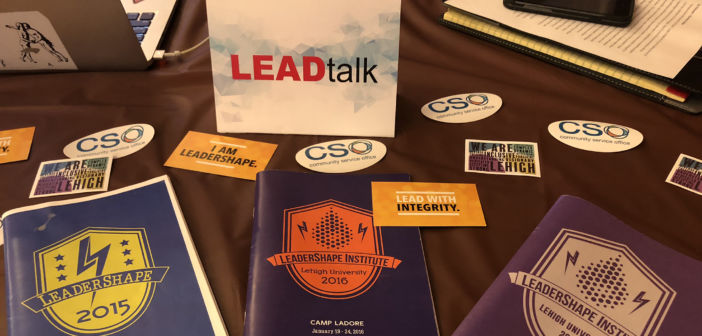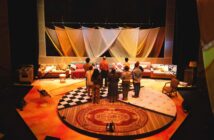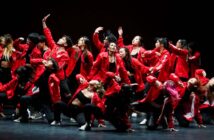Preom Sarkar, ’18, attended the LeaderShape Institute in 2016 unsure of what to expect — the program consisted of a six-day retreat in the Poconos with 60 other Lehigh students, who were essentially strangers to one another.
But by the end of the week, they left as a family.
The LeaderShape Institute was built with the intention of bridging diverse groups in a common environment where students could learn and teach each other about different aspects of leadership.
“The fact that you meet so many people who are different than you all across campus, that you wouldn’t have crossed paths with before, was really cool,” Sarkar said.
LeaderShape attendees often returned wanting to hear more stories about the leadership experiences of their peers, said Christina Jordan, a LeaderShape facilitator and the assistant director of the Community Service Office.
That’s when the idea for LEADtalk emerged, which is the LeaderShape version of a TEDTalk. Students from various LeaderShape cohorts are invited to speak and share the challenging and inspirational anecdotes of their leadership journeys.
The second annual LEADtalk was held in Lamberton Hall on March 26. The event consisted of four talks with five speakers, who all shared their own perspectives on leadership.
The speakers were required to discuss their leadership journeys, but the rest of the format was open for interpretation.
Kevin Mittal, ’19, attended LeaderShape Institute this year and spoke at the LEADTalk. He drew inspiration from his leadership experiences in high school, his fraternity and his work experience.
Mittal had the idea to host a “campus connector” party that would allow students in different organizations to come together, meet new people and ultimately unite the Lehigh community. He made his plans for change a reality, and the event was held on Feb. 19.
“It really wasn’t until I got to LeaderShape that I felt empowered to do it, not only because they talked about the skill sets and strategies you can use to improve,” he said, “but because I had a lot of people in one place who were also really passionate about the same thing.”
Mittal said one of the topics discussed during the LeaderShape retreat was how to make campus feel more inclusive. He said often the Greek, non-Greek and athletic communities can feel very separate, and he wanted to create change.
Sarkar said she returned to the LeaderShape Institute in 2018 as an on-site coordinator.
“It was really cool because I knew what to expect but at the same time, I didn’t because I was in a different role,” she said. “For me what was worth it was seeing everyone else go through this journey of change and leadership and developing themselves as a person, the same way that I went through.”
Jordan said this kind of diversity and linking of groups is what the LeaderShape Institute aims to provide. The program represents students from first-years to seniors, each academic college, different campus involvement and varying degrees of leadership experience.
Jordan said no one in the program is labeled, and no barriers are put up between the attendees.
“It’s the power of being able to coexist with people who are completely and totally different from you, who are complete strangers, and suddenly leaving being a family,” she said.
Jordan wants those who go through LeaderShape to become change agents and impact the people around them, especially those who do not attend the retreat. The goal is for others to see the impact the program can have and realize they possess the ability to make change happen.
“LeaderShape has brought this invigorating energy back onto campus,” Sarkar said, “I feel like it happens every year. The 60 participants come to LeaderShape and they come back wanting to make the campus a better place.”






Comment policy
Comments posted to The Brown and White website are reviewed by a moderator before being approved. Incendiary speech or harassing language, including comments targeted at individuals, may be deemed unacceptable and not published. Spam and other soliciting will also be declined.
The Brown and White also reserves the right to not publish entirely anonymous comments.
1 Comment
“Mittal said one of the topics discussed during the LeaderShape retreat was how to make campus feel more inclusive. He said often the Greek, non-Greek and athletic communities can feel very separate, and he wanted to create change.”
Is the athletic community not a part of the other two mentioned communities?